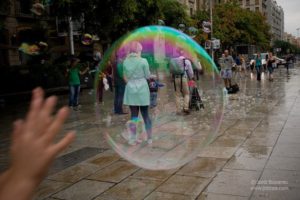A recent article in the NY Times addressed the issue of the notorious filter bubble in social media, namely the phenomenon that we tend to be served up by Facebook and other services the stories that contain the same points of views as items we have liked in the past, thus reinforcing the views and beliefs we already hold. In that way, we tend not to be exposed to opposing points of view or alterative takes on issues. This has been much in the news since the US presidential election, with many stories about the viral spread of fake news stories within Facebook and other online communities. Given the media coverage about the filter bubble, interest has developed, at least in some folks, about how one might break out of it, in order to gain some insight into the other side. The Times articles points to tools and sites which let users see to what extent they might be trapped in a filter bubble. The Chrome browser extension, PolitEcho, for example, lets you “find out how polarizing the content on your news feed is”:
PolitEcho shows you the political biases of your Facebook friends and news feed. The app assigns each of your friends a score based on our prediction of their political leanings then displays a graph of your friend list. Then it calculates the political bias in the content of your news feed and compares it with the bias of your friends list to highlight possible differences between the two.
Similarly, NPR has made available a quiz, which purports to show if “you live in a bubble”. The first question is “Have you ever lived for at least a year in an American neighborhood in which the majority of your 50 nearest neighbors did not have college degrees?”. The article also discusses “other tech products invite us to reach out and understand other people without the hassle of actually talking to the”, such as a Twitter plug-in that replaces your regular Twitter feed with “that of a random, anonymous user of a different political persuasion” or an iPhone app which makes a game out of changing color (red or blue) depending on the political bent of the news source you are reading.
A number of other sites and tools are listed in the article. The author points to the irony of many of the suggestions coming from the very sources that are responsible for the filter bubble: “A cynical impulse lies behind many of these kumbaya vibes. The same social media networks that helped build the bubbles are now being framed as the solution, with just a few surface tweaks.” That is especially the case with Faceboook. Its founder, Mark Zuckerberg, famously claimed after the election that it was a “crazy idea” that the fake news stories on Facebook could have influenced the election. That, despite the fact that a Pew study has shown that 62 percent of Americans get their news from social media, with of course the big player being Facebook. Facebook did subsequently take some measures, using third-party fact-checkers and giving users the ability to manually report fake news. More recently, Zuckerberg has significantly changed his tune, releasing a manifesto, Building Global Community, in which he claims for Facebook a central role in making the world better by exposing us to new ideas and different perspectives. It remains to be seen to what extent that means a change in how Facebook news is delivered.
